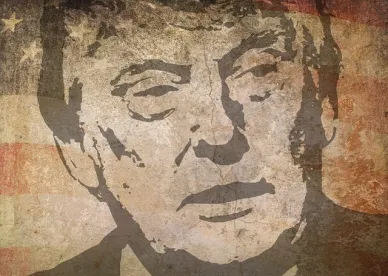On July 14, 2017, President Donald Trump made his third group of nominations of prospective United States Attorneys. This brings the current number of Trump’s United States Attorney nominations to twenty-three – overviews of the previous nominations can be found here and here. The six lawyers Trump nominated last week are:
-
Peter E. Deegan. Jr., an Assistant United States Attorney (and current Chief of the Criminal Division) in the Northern District of Iowa, to the United States Attorney for the Northern District of Iowa.
-
Robert J. Higdon, Jr., a partner in the Raleigh, North Carolina, office of Williams Mullen, to be the United States Attorney for the Eastern District of North Carolina.
-
Jeffrey B. Jensen, a partner in the St. Louis office of Husch Blackwell, to be the United States Attorney for the Eastern District of Missouri.
-
Thomas L. Kirsch II, a partner in the Chicago office of Winston & Strawn, to be the United States Attorney for the Northern District of Indiana.
-
Marc Krickbaum, an Assistant United States Attorney in the Northern District of Illinois, to be the United States Attorney for the Southern District of Iowa.
-
Joshua J. Minkler, the current Interim United States Attorney for the Southern District of Indiana, to be the United States Attorney for the Southern District of Indiana.
These nominations continue a couple of trends from previous nominations. Sixteen of Trump’s twenty- three nominees to this point have come from states with two Republican Senators where the “blue slips” approving Presidential nominations are likely easier to come by. Seventeen of the Trump nominees come from small or medium districts as DOJ categorizes them, where the addition of another lawyer can make a significant difference in how the office workload gets distributed.
The most recent group of Trump nominees is similar to previous Trump nominees (and former President Obama’s United States Attorneys) in other ways as well:
-
These six nominees average around 21 years of legal experience. Trump’s nominees as a whole now average around 22 years of experience, while Obama’s nominees averaged around 23 years of experience.
-
All six in this group of nominees have prior prosecutorial experience, as all but one of Trump’s nominees to this point have. A little more than 80% of Obama’s nominees had prior service as prosecutors at the time of nomination. Close to 75% of Trump’s nominees have federal prosecutorial experience, which is slightly higher than the approximately 60% of Obama nominees who served as federal prosecutors prior to nomination.
The current group of nominees differs from the first two Trump groups in a couple of ways, though. While over half of Trump’s nominees before last week had state prosecutorial experience, only one of the six most recent nominees (Joshua Minkler of Indiana) previously served as a state prosecutor. This brings the percentage of Trump nominees with state prosecutorial experience down to around 43%, which is closer to the less than a third of the Obama nominees who served as state prosecutors prior to nomination. Trump’s most recent nominees also have much more large law firm experience than the previous two groups: four of six in this group are either currently working in or have worked in large law firms (Deegan, Higdon, Jensen, and Kirsch), compared to just three of the previous seventeen. Trump’s nominees so far have somewhat more large law firm experience than Obama’s did – around 30% for Trump to around 20% for Obama.
Trump’s nominees as a group also differ from Obama’s in another way. As of this group of nominations, three of Trump’s nominees have prior service as a sworn law enforcement officer: Jeffrey Jensen and Russell Coleman (the nominee for the Western District of Kentucky) previously served as FBI agents, and Brian Kuester (the nominee for the Eastern District of Oklahoma) was a police officer before he went to law school. Only one of the more than 100 Obama United States Attorneys (Malcolm Bales of Texas) had service as a sworn law enforcement officer before being nominated. Trump’s nomination of lawyers with sworn law enforcement experience is part and parcel with his nomination of lawyers with state court prosecutorial experience in continuing to emphasize efforts to combat violent crime.
Here are a couple of stray observations:
-
Trump’s nominations of Chicago residents Kirsch and Krickbaum to non-Illinois districts mean both will be moving if they are confirmed, but they will be going to familiar places – both have prior service as Assistant United States Attorneys in the offices they have been nominated to lead.
-
In naming Higdon to the Eastern District of North Carolina position, Trump has made his first nomination for one of the United States Attorney slots in the Department of Justice’s Order of Succession. The first United States Attorney position in that Order, the United States Attorney for the Eastern District of Virginia, is currently held by Dana Boente. Boente is one of three Obama United States Attorneys who continue to serve in those positions post-Obama (with
-
Deirdre Daly of Connecticut and John Huber of Utah), but Trump has not formally nominated Boente to continue on as United States Attorney. (Boente is also currently serving as DOJ’s Acting Assistant Attorney General for National Security.)
As noted above, Trump’s nominations to this point have largely come from small or medium districts in states with two Republican Senators. Given this trend, it is reasonable to predict that the next one or two groups of nominations will include lawyers from Alaska, Louisiana, Nebraska, South Dakota, or Wyoming – the only states left with two Republican Senators, small and/or medium districts, and no nominees to this point.




 />i
/>i
